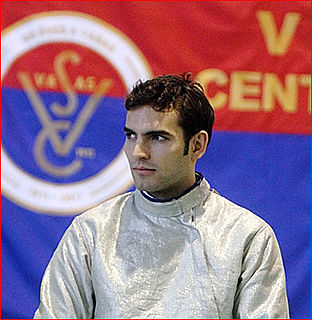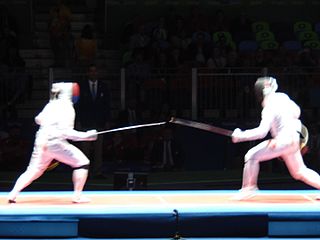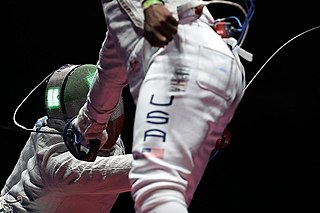
The men's épée was a fencing event held as part of the Fencing at the 1912 Summer Olympics programme. It was the fourth appearance of the event, which had been introduced in 1900. The competition was held from 11 to 13 July at the Östermalm Athletic Grounds. There were 93 competitors from 15 nations. Each nation could enter up to 12 fencers. The event was won by Paul Anspach of Belgium. His countryman Philippe le Hardy took bronze. Silver went to Denmark's Ivan Joseph Martin Osiier, the only medal won by the perennial Olympian who competed in seven Games over 40 years. The medals were the first in the men's épée for both nations.

The men's épée was a fencing event held as part of the fencing at the 1920 Summer Olympics programme. It was the fifth appearance of the event. A total of 80 fencers from 13 nations competed in the event, which was held from August 20 to 23, 1920. Each nation was limited to eight fencers, down from 12 in 1908 and 1912. Of the six fencing events, the only one in which Nedo Nadi did not win a gold medal was the one in which he did not compete. Instead, a trio of Frenchmen swept the medals. It was Lippmann's second silver medal in the event, he having previously taken second in 1908; he was the second man to win multiple medals in the individual épée.

The men's épée fencing competition at the 2008 Summer Olympics in Beijing took place on August 10 at the Olympic Green Convention Centre. There were 41 competitors from 23 nations. The event was won by Matteo Tagliariol of Italy, the nation's first victory in the event since 1960 and first medal of any color since 1968. It was Italy's seventh overall victory, most among nations. The silver medal went to Fabrice Jeannet of France. José Luis Abajo earned Spain's first men's individual épée medal with his bronze. The Russian fencers' streak of five Games on the podium ended.

The men's foil fencing competition at the 2008 Summer Olympics in Beijing took place on August 13 at the Olympic Green Convention Centre. There were 26 competitors from 21 nations. The event was won by Benjamin Kleibrink of Germany, the nation's first victory in the men's foil. Yuki Ota's silver was Japan's first medal in the event. Salvatore Sanzo of Italy took bronze, becoming the 10th man to win multiple medals in the event.

The men's sabre fencing competition at the 2008 Summer Olympics in Beijing took place on August 12 at the Olympic Green Convention Centre. There were 40 competitors from 21 nations. The event was won by Zhong Man of China, the nation's first medal in the men's sabre. Nicolas Lopez's silver put France back on the podium after a one-Games absence. Mihai Covaliu of Romania became the 13th man to win multiple medals in the event, adding a bronze to his 2000 gold medal.

The men's épée was one of seven fencing events on the Fencing at the 1928 Summer Olympics programme. It was the seventh appearance of the event. The competition was held from 6 August 1928 to 7 August 1928. 59 fencers from 22 nations competed. Each nation could have up to three fencers. The event was won by Lucien Gaudin of France, the nation's third victory in the individual men's épée—taking sole possession of most among nations above Cuba and Belgium, each at two. Gaudin was the second man to win both the foil and épée events at a single Games. It was the third consecutive Games at which France reached the podium in the event. Two Frenchman had reached the head-to-head final; Gaudin won over Georges Buchard, who received silver. Bronze in 1928 went to American George Calnan, the nation's first medal in the event.

The men's épée was one of seven fencing events on the fencing at the 1936 Summer Olympics programme. It was the ninth appearance of the event. The competition was held from 9 August 1936 to 11 August 1936. 68 fencers from 26 nations competed. Nations were limited to three fencers. The event was won by Franco Riccardi of Italy, the nation's second consecutive victory in the men's épée. Riccardi's teammates Saverio Ragno and Giancarlo Cornaggia-Medici took silver and bronze, respectively, to give Italy a medal sweep—Italy's first and the fourth overall in the event. Cornaggia-Medici, who had won gold in 1932, became the fourth man to win multiple medals in the individual épée. For the first time, France competed in the event but did not win any medals.

The men's épée was one of seven fencing events on the fencing at the 1952 Summer Olympics programme. It was the eleventh appearance of the event. The competition was held from 27 July 1952 to 28 July 1952. 76 fencers from 29 nations competed. Nations were limited to three fencers each. The event was won by Edoardo Mangiarotti of Italy, the nation's fourth consecutive victory in the men's épée. It was also the fourth consecutive year that Italy had at least two fencers on the podium in the event, as Edoardo's brother Dario Mangiarotti took silver. Bronze went to Oswald Zappelli of Switzerland. Zappelli and Edoardo Mangiarotti had faced each other in a barrage for silver and bronze medals in 1948, which Zappelli had won; the two men were the fifth and sixth to earn multiple medals in the event.

The men's épée was one of ten fencing events on the fencing at the 1996 Summer Olympics programme. It was the twenty-second appearance of the event. The competition was held on 20 July 1996. 45 fencers from 21 nations competed, a sharply reduced number from prior Games which generally had 60 to 80 fencers. Each nation remained limited to 3 fencers in the event. The event was won by Aleksandr Beketov of Russia, the nation's first victory and first medal in the event in its debut. Iván Trevejo's silver was Cuba's first medal in the event since Ramón Fonst won the first two gold medals in 1900 and 1904. The bronze went to Géza Imre of Hungary, that nation's first medal in the men's individual épée since 1980. France's four-Games podium streak ended.

The men's foil competition in fencing at the 2012 Olympic Games in London was held on 31 July at the ExCeL London Exhibition Centre. There were 38 competitors from 20 nations. Lei Sheng of China won the gold medal, beating Alaaeldin Abouelkassem from Egypt in the final. It was the first medal in the individual men's foil for each of those nations. Choi Byung-chul of South Korea took bronze. The 2012 podium was the first time since 1904 that no European fencer won a medal in the event.

The men's sabre competition in fencing at the 2012 Summer Olympics in London was held on 29 July at the ExCeL London Exhibition Centre. There were 37 competitors from 21 nations. Hungary's Áron Szilágyi won the gold medal, beating Diego Occhiuzzi of Italy won took silver. Nikolay Kovalev from Russia won the bronze. Szilágyi's gold medal was Hungary's 13th in the men's sabre.

The men's épée competition in fencing at the 2016 Summer Olympics in Rio de Janeiro was held on 9 August at the Carioca Arena 3. There were 38 competitors from 20 nations. South Korea's Park Sang-young won the individual gold, the first victory for South Korea in the event after bronze medals in 2000 and 2012. Géza Imre took silver, Hungary's first medal in the event since 1996. Imre, at age 41, was the oldest individual fencing medalist since 1952. Gauthier Grumier of France earned bronze.
The men's foil competition in fencing at the 2016 Summer Olympics in Rio de Janeiro was held on 7 August at the Carioca Arena 3. The medals were presented by Paul Tergat, IOC member, Kenya and Donald Anthony Jr., Executive Board Member of FIE. There were 35 competitors from 19 nations. The event was won by Daniele Garozzo of Italy, the nation's ninth victory in the men's foil and first since 1996. The silver medalist was American Alexander Massialas, earning the United States' first medal in the event since 1960. Timur Safin of Russia took bronze.

The men's sabre competition in fencing at the 2016 Summer Olympics in Rio de Janeiro was held on 10 August at the Carioca Arena 3. There were 32 competitors from 25 nations. The event was won by Áron Szilágyi of Hungary, the fourth man to successfully defend an Olympic title in the sabre and 14th to win multiple medals of any color. It was Hungary's 14th gold medal in the event, half of all possible. Daryl Homer earned the United States' first medal in the event since 1984 with his silver, while Kim Jung-hwan took South Korea's first individual men's sabre medal ever with his bronze.

The men's foil event at the 2020 Summer Olympics is scheduled to take place on 26 July 2021 at the Makuhari Messe. 36 fencers from 18 nations are expected to compete.

The women's foil event at the 2020 Summer Olympics took place on 25 July 2021 at the Makuhari Messe. 34 fencers from 18 nations are expected to compete.

The men's épée event at the 2020 Summer Olympics is took place on 25 July 2021 at the Makuhari Messe. 36 fencers from 18 nations competed.

The women's épée event at the 2020 Summer Olympics took place on 24 July 2021 at the Makuhari Messe. 34 fencers from 18 nations competed.

The men's sabre event at the 2020 Summer Olympics is scheduled to take place on 24 July 2021 at the Makuhari Messe. 36 fencers from 18 nations are expected to compete.

The women's sabre event at the 2020 Summer Olympics is took place on 26 July 2021 at the Makuhari Messe. 36 fencers from 18 nations competed.
















